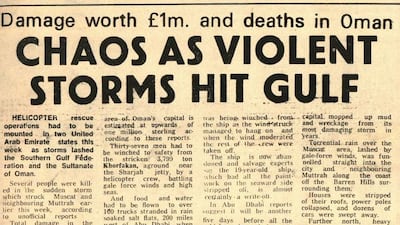The United Arab Emirates has been spared the devastation of conflict at home. Our earthquakes are mild, our shores are not swamped by tsunamis, major epidemics generally pass us by. However, this country, like any other, needs to be equipped to deal with the challenges to what can be described as our “civil security” that are posed by natural disasters or man-made events.
A couple of years ago, Athol Yates, a professor at Khalifa University, began to collect information on past threats to our civil society so he could teach his students about them. Finding little available in the way of academic studies, Yates and a few helpers turned to the files of old newspapers. The result is a fascinating book focusing on the 1970s and titled Catastrophes, Crashes and Crimes in the UAE.
Now available for the general public, the book reproduces a selection of original stories taken from now-defunct publications such as Gulf Weekly Mirror, which was based in Bahrain and, later, Dubai. Other stories are from Abu Dhabi News, which was based in the capital and was founded before the Federation. It later became UAE News and, later still, Emirates News, of which I was managing editor from 1985 to 1999.
For old-timers, the book will bring back memories. And for those who can’t remember as far back as the 1970s, there is much that sheds light on the way things were.
One highlight are the five hijacking dramas in Dubai in July 1973, December 1973, November 1974, June 1977 and October 1977. In several, Sheikh Mohammed bin Rashid played a leading role, being described in an October 1977 headline as the “Cool man on the hot line”.
Another story, from October 1977, covers the shocking assassination of the UAE’s Minister of State for Foreign Affairs, Saif Ghobash, at Abu Dhabi Airport.
Also well-covered is Iran's occupation of the islands of Greater and Lesser Tunb in November 1971, just before the federation was established. Abu Dhabi News led its story with the paragraph: "Iran's invasion of the two tiny Gulf islands of Greater Tunb and Lesser Tunb cast a dark shadow over the official formation of the Union of Arab Emirates." More than 45 years later, the occupation continues.
Earthquakes, cyclones and floods? There are a plethora of those, including the “worst ever storm” in February 1974, when the sea wall on Abu Dhabi’s Corniche was breached. Power cuts were common: in August 1975, more than half of Dubai was blacked out for hours because of a fire in the main power station.
Maritime incidents? In September 1972, 70 people were rescued from a sinking dhow near the Umm Shaif oilfield. In July 1978, five people drowned off Ras Al Khaimah on their way to a wedding.
Moving on to hotel fires, one in April 1976 at the long-vanished Omar Khayyam Hotel in Abu Dhabi saw seven people die when an illegally built roof extension caught fire. Tough new fire precautions were promptly introduced.
Reports of crimes are there in abundance. In October 1972, 15 people were convicted of begging during Ramadan, while in June 1974 there were reports of forged Dh50 currency notes. In December 1974, a bank clerk in Khor Fakkan tried to carry out an armed robbery of his own branch, eventually committing suicide when the attempt failed.
In February 1976, the Gulf Weekly Mirror reported that a "passport scandal" had prompted "a big illegal immigration clampdown". At that time, visitors with a return air ticket could deposit their passports on arrival and obtain a 96-hour transit visa. The paper reported that "the number of unclaimed passports collected during the past year puts the figure at nearly 50,000." Back then the total population was less than 625,000.
In September 1976, an attempt to smuggle about 1,200 illegal immigrants into the UAE ended in tragedy when more than 170 drowned.
In December 1978, there were reports of a UFO in Dubai, which was tracked by a police car and a patrol boat before disappearing. Whether or not it was the same one allegedly seen over Sharjah a couple of months later was never resolved.
In August 1976, a campaign to eradicate malaria was to be launched. It was successful: all cases today are of people who arrive in the country already infected with the disease. In April 1978, it was announced that the UAE was free of smallpox.
All this and more is contained in Yates’s compilation of the Catastrophes, Crashes and Crimes from yesteryears. It’s a fascinating read whether or not you believe UFOs have ever scouted Sharjah.
Peter Hellyer is a consultant specialising in the UAE’s history and culture.


